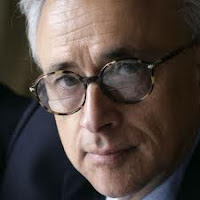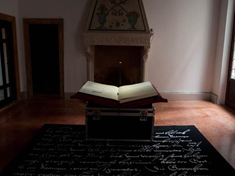 |
| Scuola di San Rocco |
 |
| Antonio Damasio |
According to Wired, Damasio is one of the most important neuroscientists of his generation; his latest book is called Self Comes to Mind. Damasio spoke about the importance of emotion with respect to consciousness, and said we cannot be conscious without feelings -- something I always thought was obvious, but apparently not -- Damasio said feelings are often ignored in accounts of consciousness. I was surprised to hear this information because my personal method of consciousness relies heavily on how I feel about something, even if I am being told something entirely different; my memories are stronger if there is emotion attached to the memory. Damasio said that the most important qualities for a human being are beauty and compassion for others, something I, too, strongly believe, and something that seems to becoming more of a rarity on this planet. From Wired:
...reflection on the experience of conscious minds also convinced me that feelings need to be given an even more important role in the making of subjectivity. We do not merely perceive objects and hold thoughts in our minds: all our perceptions and thought processes are felt. All have a distinctive component that announces an unequivocal link between images and the existence of life in our organism.
To read the entire Wired interview by Jonah Lehrer, please click HERE.
The party over at Ca' Foscari after the inauguration was fantastic, with an international feast. Yummy Venetian, North African, Chinese and South American food was on the menu, all prepared by La Dogaressa, accompanied by an unending supply of excellent prosecco from the Consorzio Tutela del Conegliano Valdobbiadene. Moleskine was there with its enormous Infinite Writing book, a project by Bili Bidjocka, who is collecting the marks of handwriting for a time capsule for the future. I love Moleskine, and use their agendas faithfully to record all my trials and tribulations -- mine is red. On the page where you record who to return to in case of loss, I wrote "As a reward: $TICKET TO HEAVEN." The Moleskine representatives at the party were uber-cool. I raved about their product, and told them I would not exist with my Moleskine -- and was rewarded with a nifty Moleskine WikiAfrica notebook! From Moleskine:
 |
| Ecriture Infine/Infinite Writing |
Ecriture Infine/Infinite Writing is an art project that celebrates a 3500-year-old invention: handwriting. Created by Cameroonian artist Bili Bidjocka, it consists of a series of eight volumes that travel the world collecting the marks of handwriting as we know it. Once completed, the volumes are wrapped in a linen cloth, sealed and hidden in a secret place, like a time capsule. Will the people who discover them in thousands of years be able to understand what they mean?
We were asked to express our thoughts and feelings about handwriting. I wrote: "Handwriting is the mark of the soul. Cat Bauer - April 18, 2012." In fact, everyone can participate in the project through the miracle of cyberspace. Go to the Moleskine page, and follow the instructions to upload your handwriting.
 |
| Ghada Abdel Aal |
Wanna be a bride (Egyptian Arabic: عايزة أتجوز [ˈʕæjzæ (ʔæ)tˈɡæwːez]) alternately translated as Wanna-B-A-Bride or literally: I Want to Get Married is the title of a popular Egyptian book based on a blog of the same name about the several (failed) marriage proposals the author Ghada Abd El-Aal has gone through.The book was published by the Egyptian printing house Shorouk in 2008. It has been translated into Italian by Barbara Teresi and released under the title Che il velo sia da sposa! by the Italian printing house Epoché Edizioni. It has also been translated into English by Nora Eltahawy, published by the University of Texas Press on 23 September 2010.
Aal said that before the Internet, living in Eqypt was like living on separate islands. There was a law that it was forbidden to talk about politics, and any group of three people or more could be arrested. After going online, she discovered she wasn't the only one interested in books, culture and politics. She said that in Egypt, the way people got married was that you would meet your future husband three or four times, and then be asked to make a decision. Nothing was forced upon you; you could always say no; but you spent more time in deciding what refrigerator to buy than you did on your future husband. She thought something was wrong with that, and started blogging about it with humor, and found an audience who felt the same way she did, both male and female. When asked about the recent revolution in Egypt, she said that "Our country deserves a better future -- better than the one we were living in." She said that it took ten years to have a revolution after living for 30 years under a corrupt regime and that more time was needed to learn what the results are. "You can't judge a revolution after 24 months."
 |
| Malika Mokkeddem |
Malika Mokkeddem was born on October 5, 1949 in Kenadsa, a small mining town on the limit of the western desert of Algeria. She is the daughter of an illiterate nomad family who became sedentary. She grew up listening to the stories told by her grandmother, Zohra, and was the only girl in her family and town to finish secondary studies. She enrolled to study medicine in Oran and finished her studies in Paris. She specialized in Nephrology and later established in Montpellier in 1979. She practiced till 1985 when she decided to dedicate her time to literature.
Mokkeddem said that she wanted to get away from her family, and to be exiled from one's family is the worse thing. "Not everyone is fortunate enough to be an orphan." She said that many people drown in the Mediterranean sea trying to get away from her country, and that the sea was like a "liquid continent."
 |
| Alawiya Sobh |
Alawiya Sobh (Arabic: علوية صبح) (born 1955) is a Lebanese writer and novelist.[1] She was born in Beirut and studied Arabic and English literature at the Lebanese University. Upon graduation in 1978, she pursued a career in teaching. She also started publishing articles and short stories, at first in An-Nida newspaper and then in An-Nahar. After a spell as cultural editor, she became editor-in-chief of Al-Hasnaa, a popular Arabic women's magazine, in 1986. In the 1990s, she launched her own women's magazine and runs it to this day. Sobh has written a number of novels. Her debut novel Maryam al Hayaka (2002) was critically acclaimed. Dunya was published in 2006. A recent novel It's Called Love was longlisted for the Arabic Booker Prize in 2010.
 |
| Howard Jacobson |
Although Jacobson has described himself as "a Jewish Jane Austen" (in response to being described as "the English Phillip Roth"), he also states, "I'm not by any means conventionally Jewish. I don't go to shul. What I feel is that I have a Jewish mind, I have a Jewish intelligence. I feel linked to previous Jewish minds of the past. I don't know what kind of trouble this gets somebody into, a disputatious mind. What a Jew is has been made by the experience of 5,000 years, that's what shapes the Jewish sense of humour, that's what shaped Jewish pugnacity or tenaciousness." He maintains that "comedy is a very important part of what I do."
 |
| Marciana Library - Venice |
 |
| New York Public Library |
In short, the CLP needs to be stopped. The stakes are not just local, and I hope readers of this column will do their part in spreading the word, whether they live in the city or on the other side of the planet.
The CLP calls for transferring 3 million volumes from the New York Public Library building on 42nd Street (the one with the lions) to storage facilities in New Jersey so that the space they now occupy can be redesigned to accommodate computers for public use. Not that books will disappear from the 42nd Street branch altogether. It will become a lending library, rather than a research collection that is available to the public but restricted to use within the building.
Please click HERE to read the entire STOP CULTURAL VANDALISM article. And, again I ask: Why isn't there a single copy of my second novel, HARLEY'S NINTH in the entire New York Public Library system, a library where I have spoken, a library that has always been supportive, a library that provided me with a Teen Advisory Group? I was told by my contacts inside the NYPL that it had been ordered, and it's not there. In addition, there were more than 40 copies of my first novel, HARLEY, LIKE A PERSON in the NYPL, both the Winslow Press and the Knopf editions. Now there is only one copy out in Fort Washington. Does it mean that when the Donnell branch was eliminated, and the children, young adult and foreign language collections were dissolved, everything just disappeared? What's going on over there?
 |
| Palazzo Ducale |
 Ghada Abdel Aal - Egypt
Ghada Abdel Aal - EgyptMalika Mokeddem - Algeria
Alawiya Sobh - Lebanon
Howard Jacobson - Great Britain
Xu Xing - China
Andrea Cavazzuti - Italy
Alicia Gimenez-Bartlett - Spain
Andrea Molesini - Venice
Ariane Ascaride - France
Robert Guediguian - France
Maaza Mengiste - Ethiopia
Hisham Matar - Libya
Alain Mabanckou - Republic of Congo
Wim Emmerik - Netherlands
Giselle Meyer - Netherlands
Steve Sem-Sandberg - Sweden
Per Olov Enquist - Sweden
Santino Alexian Spinelli - Italy
Juan Villoro - Mexico
Vladimir Sorokin - Russia
Cees Nooteboom - Netherlands
Roberto Calasso - Italy
William Dalrymple - Scotland
Here's the link to last year's Venetian Cat - The Venice Blog account:
Incroci di Civiltà 2011 - Crossroads of Civilization 2011 - Writing: The Spooky Art
Ciao from Venice,
Cat
Venetian Cat - The Venice Blog
The glorious -- and I use that word sincerely -- Scuola di San Rocco was the setting for the inauguration of 2012 edition of Crossroads of Civilization, Venice's international literary festival. On Wednesday, April 18, under the vibrant Tintoretto ceiling, the house was crammed full of lovers of literature. It is always invigorating to be surrounded by so many other members of civilized culture in an ancient venue created by enlightened beings, and it made me grateful to live in a city where such events occur on almost a daily basis.
ReplyDelete